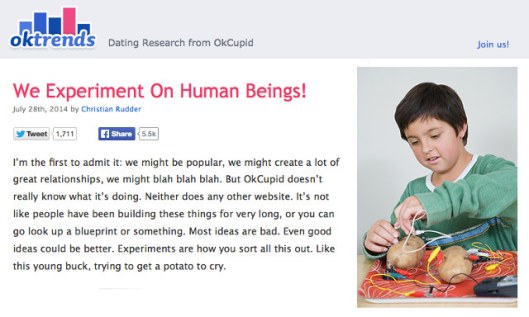Tags
dating, Dating Apps, dating tips, experiment, facebook, facebook experiment, instagram, instamour, message privacy, messaging app, okcupid, okcupid experiment, plenty of fish, plentyoffish, privacy, profile picture, relationship, sex, snapchat, socialcam, tinder, video chat rooms, video online chat
At this point, everyone has probably heard about the experiments that Facebook has run on their users. And in case you didn’t know, OkCupid has been doing it for quite some time as well. The latest blog post by Christian Rudder entitled We Experiment On Human Beings! seems to have hit people pretty hard. The real question here is: How far is too far when it comes to your profile pictures, information, answers you’ve made to questions, or messages that you send?
Apparently the answer is: As far as companies can possibly go without getting sued.
Unfortunately, when you sign up for a social network or a dating site, you are accepting their terms & conditions and privacy policy. Has anyone actually read any of these lengthy, legally verbose documents? Believe it or not, I actually have, and they aren’t pretty. In a nutshell, you are giving up all of your privacy, and are allowing companies to share your information, analyze your data and sell it even. The truth is, it seems like most people just don’t care…until it personally affects them in a negative way.

Personally I don’t agree with the way companies, whether social networks or dating sites treat people like animals, numbers, or worse. This is exactly why I started a company that does the opposite. One of the best things about living in America, is the ability to start a company using your beliefs, and treating people with respect. We don’t “play” around with our members, nor do we “experiment” with them. As a matter of fact, we would rather our members simply engage in conversations without ever analyzing the data we get. Mostly because we don’t save any information that they exchange.
In a world where our privacy is constantly being invaded by corporations, government agencies, and social networks, how can we trust any new companies? Well the short answer is: We can’t. But there is a solution (and you’re not going to like it): Just accept that privacy sharing is a part of technology and life in general. Once you accept it, and are ok with your information floating around cyberspace you will feel better about it. My suggestion is to be careful what you put out there, and use private networks, or private groups for things you don’t want made public. As a matter of fact, most of the things I share with people that I don’t want public,

I don’t post online in social networks or public forums. I keep that to private chat networks, text messages, emails, phone conversations, Skype conversations, or in person meetings.
If you are paranoid about your privacy being shelled out to companies for money, then do the same thing. I guess that’s one reason why video technology is flourishing more than anything nowadays. Videos don’t contain text or personal information. Text information and even profile photos are easy to analyze using programs, algorithms and highly intelligent engineers who can parse large amounts of data. But how do you analyze a personality or characteristics of a person on video using those same methods? Well the answer is simple: A human can do that, software is catching up, but not there entirely. That means a company would have to analyze each video one by one. This is expensive and time consuming, but also a much safer alternative for consumers.
Looks like the next wave of privacy issues will be layered on top of video technology, and I’m guessing that the companies who can figure out how to tap into those 30 frames per second are the ones who are going to be creating a whole new wealth of databases and information to sell to large corporations in the next century.
Tiny URL for this post:

